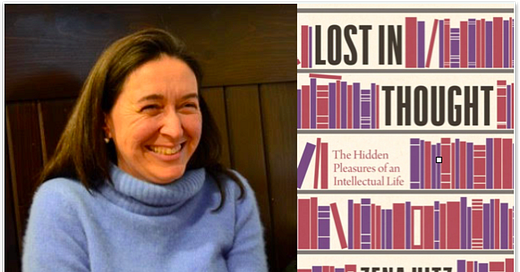You can listen to the newsletter by clicking the play button above or you can click the “Listen in Podcast app” link and follow the directions to open this feed in your podcast app. Currently, you may find the feed on Apple Podcasts, Stitcher, and Spotify.
In our “Readings in the Christian Imagination,” reading group this past Monday, we had the pleasure of hosting Zena Hitz for a time of discussion centered on her recent book, Lost in Thought: The Hidden Pleasures of an Intellectual Life.
In today’s podcast, you can listen to that event. During the first part of the hour, Mike Sacasas interviewed Prof. Hitz about her book, and during the latter part of the hour she fielded questions from other members of the group.
In our next session (Monday, October 12th, 8: 00 PM), the group will continue to reflect on the life of the mind by reading and discussing “Reflections on the Right Use of School Studies with a View to the Love of God,” by the 20th century French thinker, Simone Weil. Please contact Mike Sacasas (mike@christianstudycenter.org) if you are interested in joining.

Study Center Resources
This week our director’s classes continue. If you’re subscribed to this newsletter, you’ve been seeing our posts with the recordings of both classes.
Our Wednesday Dante reading group continues making its way through Purgatorio as well.
If you are interested in joining any of these offerings, contact Mike Sacasas.
Recommended Reading
— From Gracy Olmstead’s newsletter, drawing on the work of John Sommerville, a retired UF professor and dear friend of the study center:
Journalists can do their part here by refusing to write “hot takes,” and seeking to offer readers better researched, more thoughtful news stories and op-eds. Reading biographies and histories, books of essays and longer analyses can also help us to “remember” better as we read.
Sommerville, for his part, suggests putting news “in its place” by reading it monthly, rather than daily. This would be hard to do in some seasons, but the idea of prolonging the time between news readings suggests that we could perhaps skip some of the unnecessary or repetitive content in order to develop a more storied, context-filled understanding of what’s currently taking place.





